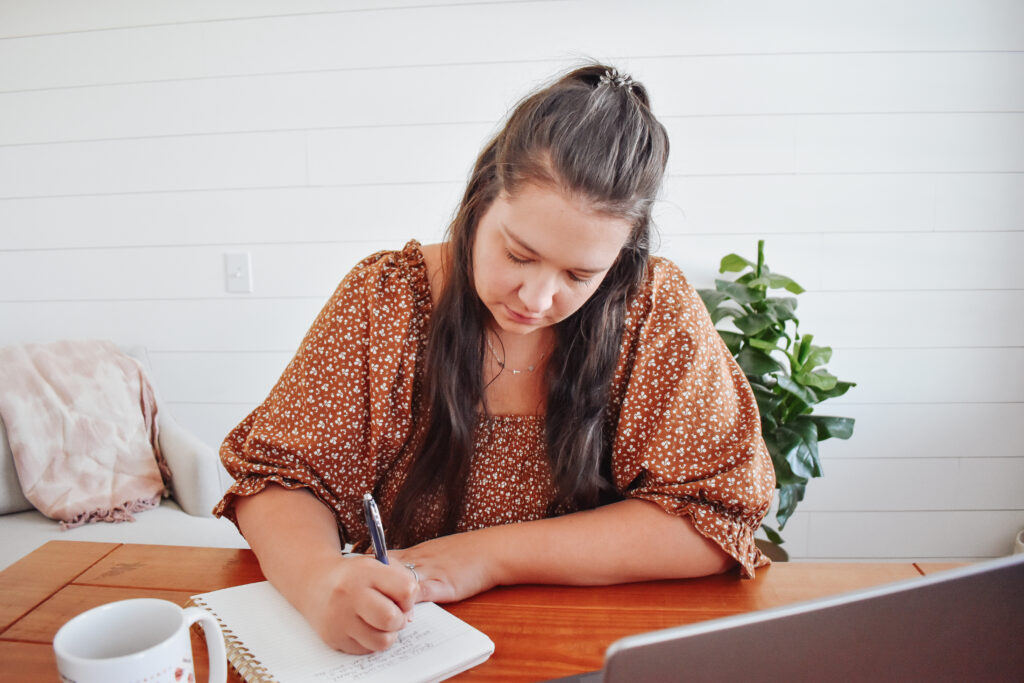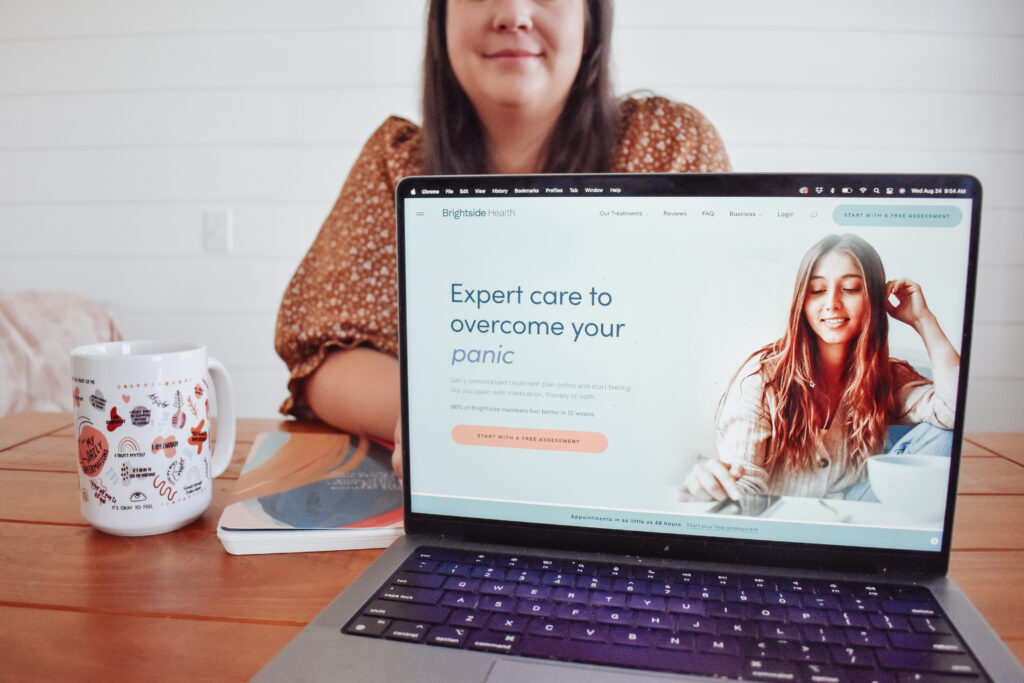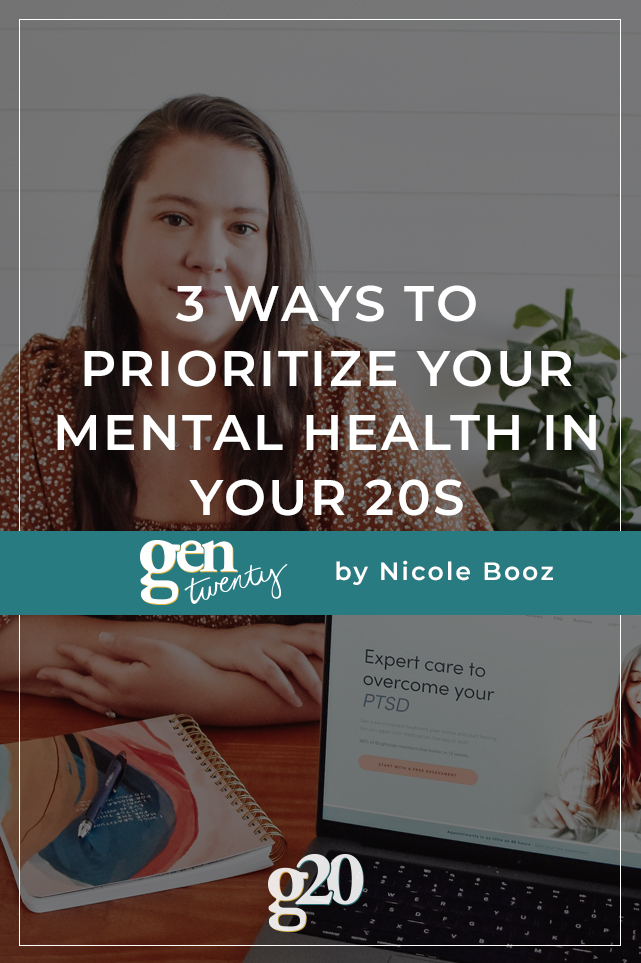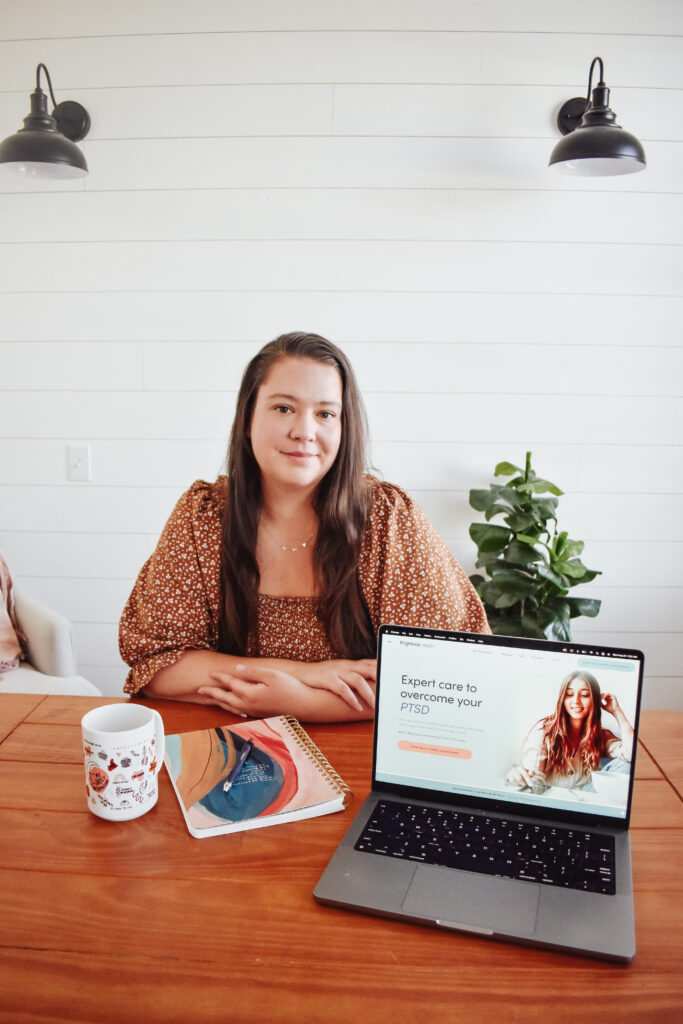This post is brought to you in partnership with Brightside, an online mental healthcare platform. Take their free assessment here.
Talking about mental health used to feel very stigmatized. I remember brining up anxiety to my mom when I was younger and she would dismiss it as just “being nervous.” While yes, sometimes I probably was nervous, the truth was that I was dealing with anxiety and didn’t know how to cope with it.
Over the years, thanks to a supportive group of friends, self-work, and research, I found a few ways to help myself cope when I feel stressed, anxious, or anywhere in between. At GenTwenty we talk a lot about mental health because we know how important it is to take care of ourselves and our minds.
Here are 3 ways to focus on your mental health in your 20s so you can cope when things get hard.
3 Ways To Prioritize Your Mental Health In Your 20s
1. Seek professional help.
As someone who first experienced an anxiety attack in my 20s, I wish I had more resources available to me sooner. Seeking professional help for your mental health, and disorders anxiety and depression, can lead to significantly better outcomes and a higher quality of life. According to NAMI, the National Alliance on Mental Illness, 75% of all life-long mental illnesses start by age 24.
If you’re in your twenties, it might be time to assess how you’re doing. And no matter your age, getting help and having some one to talk to who you trust is important. There are more resources than ever to find help for your mental health.
Brightside is an online mental healthcare platform available in all 50 states that provides personalized and affordable access to therapy and medication when necessary.
Their therapy plan is $299 per month for four video sessions and unlimited messaging with your licensed therapist. Together, you work on your personalized program that utilizes evidence-based approaches to see real change.
They have appointments available in as little as 48 hours and accept Aetna, Cigna/Evernorth, and Allegience health insurance nationwide. This is hugely important in making these kinds of services accessible! Other online platforms do not offer the same benefit.
You might be wondering if they can really treat things like Depression and Anxiety online? And the answer is yes! They use a unique approach that is based on thousands of data points to create an accurate prescription treatment plan to get you feeling better.
Beyond the initial assessment, Brightside’s treatments come in the form of a comprehensive initial consultation, weekly therapy sessions, unlimited follow-ups, prescription management and delivery, as well as self-guided lessons that enhance the individual therapy program and progress tracking.
Their services are 100% confidential and with their customized treatment plans, 86% of Brightside members feel better in 12 weeks. That’s HUGE! Learn more about Brightside here.
2. Journal
It’s common for people to sort of shut down and turn inward when they’re feeling stressed or sad. I know when I feel overwhelmed it can be hard for me to reach out to people, even just for a friendly chat or to walk in the park. When I have a lot on my mind, I journal to help me process my thoughts.
Sometimes journaling helps me figure out what I’m feeling because sometimes I just feel “meh,” but can’t figure out why or what might be the root of it. As a writer, journaling feels natural to me, but if that’s not the case for you, don’t worry! Anyone can journal, and no journaling routine or process is the same.
If you’re just getting started, try journaling a few times a week and use a prompt to help the thinking (and writing) juices flow. You can write in a beautiful notebook that makes you feel inspired or happy, you can have a private document saved on your computer, write in your “note” app on your phone, or you can scribble down on any piece of paper you have and throw it away after — there really is no “right way” to journal.
Journaling can be a safe space to unload the weight of your worries if you’re having trouble sleeping, or if you’re feeling distracted and struggling to focus at work.
I love writing to-do lists to help keep myself organized with all of the many things I do each day, and one of the tasks is a reminder to jot down my thoughts, even if just for five minutes while my younger son naps.

3. Create a Consistent Routine
Creating a consistent routine is a hugely overlooked step to taking care of your mental health, in my opinion.
Uncertainty in any part of your life can also exacerbate any underlining anxiety you might be feeling. Building a routine for yourself is a great way to support your mental health and you do not need to do anything elaborate for your routine.
I feel best when I can have quiet time to myself in the morning. Which is sometimes a challenge because I have two sweet, rambunctious little boys aged 3 and 17 months.
To help with this, my husband and I have designated “point parent” times of day. We both work from home, but he doesn’t need to be at his desk until later in the morning, so he’s in charge when we’re first waking up. This allows me to have quiet time with my coffee and laptop each morning, and I usually journal, catch up on emails, and make a plan for the day.
Then, by the time I step in as point parent, I’m awake, calm, and ready to play with my boys. I do my best to be present with them and having a little time to myself helps me be the best mom I can be.
Two other crucial parts of my self-care and daily routine are exercise and tidying. This summer we’ve been taking a long walk around our neighborhood after dinner each night. We get to do it as a family, which I love because we’re away from our screens and out in the fresh air. In the winter or on inclement weather days, I walk on the treadmill or ride my stationary bike in the evenings after the boys’ bedtime.
At the end of each day, I do a re-set. This means my husband and I put clean dishes away, dirty dishes in the dishwasher, wipe away crumbs and debris from the counter, and tackle the laundry that makes its way around our family room and kitchen. It’s not a deep clean, and it doesn’t have to be perfect, it’s just a way for me to start the next day with as little to think about as possible.
Everyone’s needs are different and your routine might look a little different. My BFF Marina sets her coffee maker up each night to auto-brew in the morning at a specific time, makes herself a smoothie or overnight oats for breakfast ahead, and rolls her yoga mat out in front of her bed so that she literally has to stretch first thing.
Routines are a great way to give ourselves a safe space, which we need when we’re feeling stressed, anxious, or out of control. There is only so much we can control in life, and a lot of is it small, actionable steps we can take for ourselves.

In Summary: 3 Ways To Prioritize Your Mental Health In Your 20s
If you want to make changes for yourself and your mental health, try these three ways to focus on your mental health. Our twenties are both a short and long decade, and you deserve to feel your best. Creating a safe space for yourself to feel, think, and process is key, and talking to a professional, journalling, and making a consistent routine for yourself is a great way to start. You are not on this journey alone!
According to the Anxiety & Depression Association of America, 6.8 million Americans are affected by Generalized Anxiety Disorder, and women are twice as likely to be affected by it as men. On top of that, Generalized Anxiety Disorder often co-occurs with major depression. I share this stat not to worry you but to remind whoever is reading that you are not alone. And no how little or much you worry, feel sad, or struggle with your mental health, there are people who want to help you, who want to support you, and who need you here.
If you or someone you love is in crisis, there are resources available to you. The National Suicide Prevention Lifeline is now just a 3 digit code you can call any time of day or night. Dial 988 if you or a loved one need immediate help.
And be sure to check out Brightside here and take their assessment to see how they can help you!





